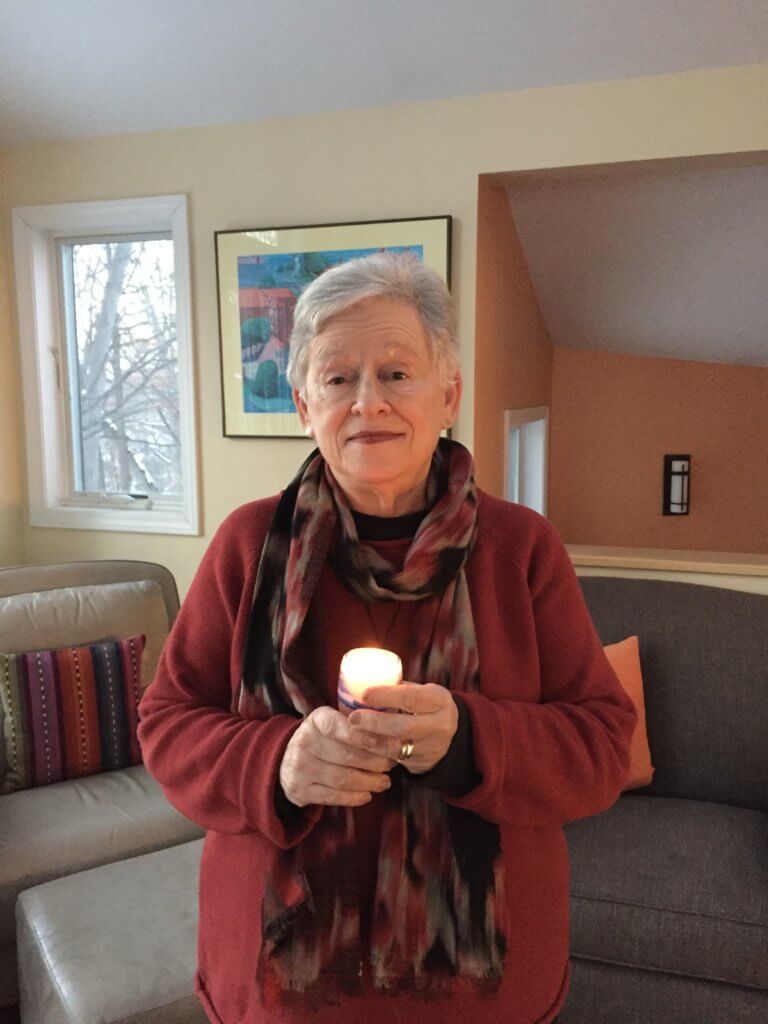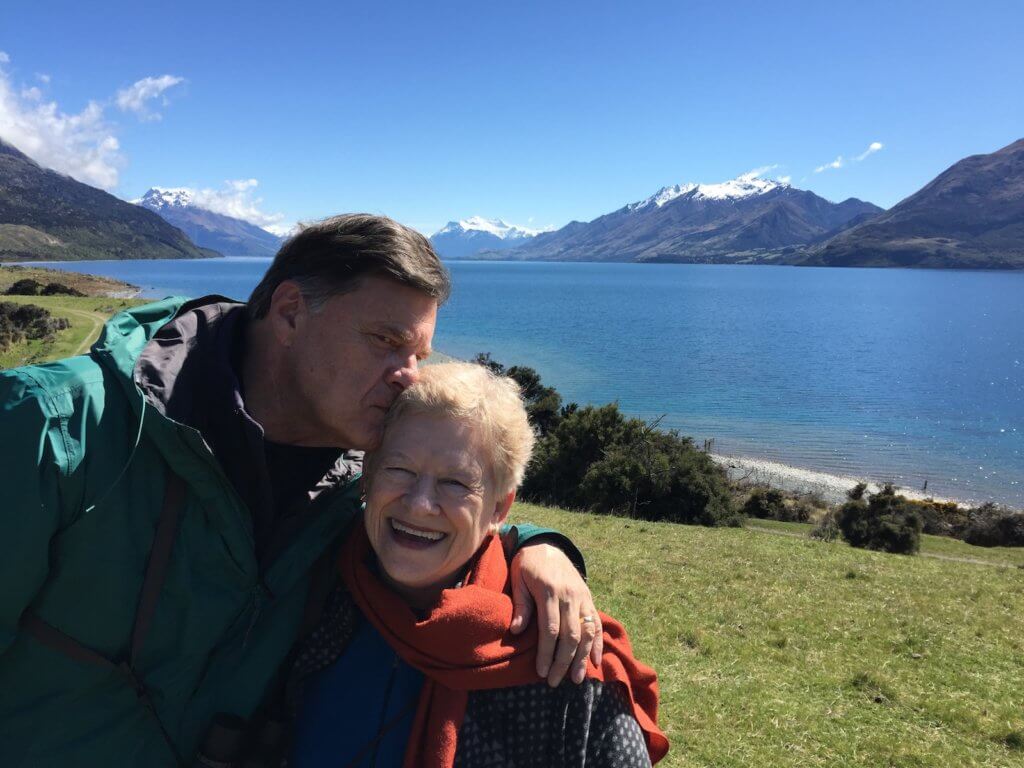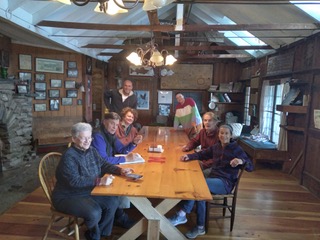
Throughout the 2020-2021 program year, we are profiling various lay leaders in our congregation. This week, we feature Phyllis Joachim, the Co-Chair of the UUSWH Internship Committee along with Marianne Laffitte. Phyllis joined UU Wellesley in April 1991.
Phyllis lives in Newton with her husband, Peter Shaw, a member of UU Wellesley Hills since May 1990. They have two daughters, Julia, age 37, and Abigail (Abi), age 31. Julia lives in rural Maine, where she works as a clinical social worker and has a farm with her boyfriend. Abi lives in Boston, where she works at a socially responsible women-run asset management company, NorthStar Asset Management; Abi is also engaged. The wedding she had planned for last Labor Day since been rescheduled to October 2021.
Recently, Phyllis met with Board of Trustees Chair Kathy Coolidge to answer a few questions about herself.
Where did you grow up and go to school?
I grew up in Philadelphia and went to public schools, including Philadelphia High School for Girls (similar to Girls’ Latin in Boston). I left Philadelphia at age 17 and never lived there again. I went to Harvard-Radcliffe and got a BA in Social Relations. After college, I volunteered for a year in East Africa and then went to graduate school in the New York University Clinical Psychology Ph.D. program.
After four years in New York City, Peter and I got married and moved back to Cambridge. I continued my training with two internships and working in the field, all while commuting to New York to consult on my dissertation. I ultimately got my Ph.D. in 1980.
What is your religious background? What brought you to UU Wellesley Hills?
Both my parents were of Jewish ancestry but neither was observant. When I was quite young I learned some Jewish traditions from my maternal grandparents. They were not religious either, but I learned to enjoy the traditional foods, the Seder — the cultural part of it came through to me. I never really felt connected to organized Jewish religion. When Peter and I decided to get married, we discussed religion. He was raised as a UU and felt more connection to the UU religion than I did to Judaism. At the time, I was very involved in the feminist movement; we decided to get married by a female UU minister. They were rare then, but we found one!
Once we had kids and moved to Newton, we wanted a religious grounding for them. We shopped around and decided UUSWH was the one for us. Both daughters went through the church school, O.W.L., and Coming of Age. Abi still feels a connection to Unitarian Universalism, and she and [fiancé] Corbin plan to be married by a UU minister; she also likes Jewish traditions like Hannukah candles and Passover Seders. Julia isn’t currently involved in any formal religious practice.

What kind of work do you do?
I’ve been a practicing psychologist for about 40 years. I trained initially in family and child therapy, but I gradually shifted to couples and individual adult psychotherapy. I’ve supervised and taught clinical skills to professionals and students in various settings. I was an adjunct instructor in a Family Medicine residency and at BU School of Medicine. I’m semi-retired, but still have a small private practice based in an office in Wellesley. I’m working virtually with my clients now and haven’t been to the office in over a year.
What parts of congregational life are most meaningful to you?
The Sunday services are very important to me. They’re what got me involved in the church, hearing John Nichols’s wise and meaningful sermons. I love the whole experience, including the choir, but it’s harder for me to connect on Zoom. I love and appreciate the way Rev. Kelly leads worship, and I get a lot out of her sermons. But what’s kept me loyal to the church all these years are the members: amazing people who are interesting, smart, accomplished, thoughtful and ethical.
You are Co-Chair of the Intern Committee — what can you tell us about that?
I’ve been on the Intern Committee for at least a dozen interns over the years. The first was when John Nichols was our minister, and the intern was Lee Blumel. When Rev. Nichols took a sabbatical during her internship, she was able to step in and cover many of his responsibilities. I gained a lot of insight about how a committee could support an Intern Minister. It was a fascinating experience for me as a new member of the committee.
Our church is known in the UUA as a valued teaching congregation. We don’t always have an intern, because some ministers choose not to have one. For example, Interim Ministers don’t have interns. Usually there’s no intern in the first year or so of a settled ministry. The internship can be one year full-time or two years half-time. It’s important that the committee provide consistent support and feedback, so it’s a commitment.
I’m co-chairing with Marianne Laffitte, and I’m so glad she’s partnering with me — she has such great skills that I don’t have! The other members are Doug Poutasse, Karen Mariscal, and Steve Fogg. We meet monthly, usually after Joan DeArtemis has preached so we can talk about the service and the sermon. We’re available to discuss any aspect of the internship that the intern would like to have feedback or mentoring on. So it’s largely up to the intern to structure what we’re going to work on together and that varies a lot from intern to intern.
We’re responsible to the UUA to evaluate the intern’s experience from the point of view of the congregation. Typically there’s a mid-point and a final evaluation. The UUA gives us a template which is sometimes hard to follow, but it gives us something to work from. We aren’t just using our own impressions and opinions, but also need to get feedback and reactions from other members about many areas — for example, adult education, pastoral care, and religious education. Any of that is useful to put together a picture of what the intern can work on going forward.
We are just now gearing up to start Joan’s final evaluation due in June. Ours is not the only evaluation: the Senior Minister does one and the intern does a self-evaluation. The committee works best when many different points of view and interests are represented.

How are you managing quarantining?
Peter and I are now past the two weeks post-vaccination period! We’re just beginning to move out of our little cocoon. We’re planning a road trip to Virginia to visit some cousins and see the Shenandoah Valley. We’ve really missed traveling, and seeing family, a lot.
What’s most important to you at this point in your life?
I hope to live long enough to have a grandchild that I can hold in my lap! My kids, Peter, and my friends are extremely important. One of the things that the pandemic has clarified for me is how important are good, long-lasting relationships. I feel blessed and protective of my family and friend relationships. I’m lucky that way.
Tags: Meet Your Leadership


